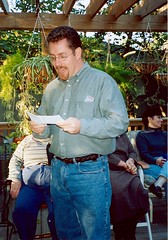Frustrated
I gotta say ... I've been working on an article for Library Journal's netConnect issue on Community information and it's getting to me. Don't get me wrong, I've seen a lot and I've learned a lot, and basically I'm glad I'm writing it, but it just gets me that we're not where I'd like us (www.jocolibrary.org) to be.
Don't know if you've seen Kansas City Public Library's page (www.kclibrary.org), but they do some cool things ... things we've talked about, but haven't pulled off yet. I know (vaguely) the guy over at kclibrary, and I guess at Internet Librarian (in Monterey) he talked about what I've been saying (though mostly to myself) for the past few years -- that we gotta stay away from trying to describe the Internet, and should focus on creating, managing and delivering high quality content that is locally relevant. That's going to be the bread and butter of the future. I don't mean that we won't be doing the book/AV thing, or even that we won't be providing leased digital content ... but I think that local content is our niche, and if we don't find it, we'll be SOL, because someone else will do it and libraries will be standing there saying ... "hmmmm ... you know, we could have done that."
Of course, we've done some good local content. I was just re-examining our JoCoFamily (www.jocofamily.net) page tonight. It was developed to help youth-at-risk, their folks, and their service providers with information about the Johnson County juvenile justice system -- basically it was supposed to be a tool to help them stay out of the legal system or to get through easily and quickly. It has some good stuff there, but it's on a system we can't easily manage, so it'll need to be forklifted ... it just seems to take so long to get stuff done.
Would love to hear what some of the rest of libraries are doing ... guess I need to take this blog more public.
I recently finished Anthony Wilhelm's Digital Nation ... the basic premise is that as we move to a more digitally connected society, we need to remember that many folks are without the skills for and/or access to technology necessary for participation. Dr. Wilhelm mentioned more than once that by pushing more services online we -- as governments, libraries and schools -- are creating an environment of depreciative value to those individuals who can get the services nowhere else.
Obviously, libraries -- specifically public libraries -- have the ability to help deal with both of these issues. At Johnson County Library (JCL), we have 350+ publicly accessible PCs for patron use. In addition, we offer training on basic PC and Internet use. One of the things that we've talked about and planned for (but not actually implemented) is providing more focused training at the library for county, state, and even federal services that can only been be accessed online.
Unfortunately, JCL is no different than many organizations -- we simply are not aligned or prepared to deliver training or other related content like this. Wilhelm comments: "Parachuting information and communications technologies into these environments without addressing underlying issues of organizational readiness, continuous professional development, and infrastructure would be precipitous." (Digital Nation, p.97).
The challenge will be to assess the real needs of the community and apply what we learn so that the realignment can happen. It'll be difficult, because the folks that we have who provide more traditional library services do not have the talents, experiences, or interests to be able to deliver the new services. But it won't be impossible ...
Our first step has been to create a Web Content Team. Their job is to assess, plan for, and develop content for the library's sites. When I say "develop," I mean create, write, and negotiate for content that people want access to. The specific focus of all of our content is localness, so the latter statement (negotiate for content) comes down to working with local agencies and organizations to get access to their stuff so that we can make it available.
The Content Team's focus matches up well with the whole training concern. If we want people to use the content, we should market it and train people how to use it via our sites. But, realignment of resources is what will make it possible.
Community Information and Libraries
I think that libraries do a pretty poor job of creating, collecting, presenting, and delivering the information about their communities. It's not that we don't have the resources available to do a good job ... I think it's that we just don't value the information enough. Which is absurb, since it is the one chunk of content that we actually have the ability to grow.
I'm talking about more than just big directories of public services, not-for-profits, and local businesses ... I'd like to see us do more to provide the answers and not just links to where the answers are. If I'm a single mother of three looking for information about afterschool daycare within a 30-minute drive (my break from work) of my kids' school and my work, I don't just want a list of daycare 17 providers that I then have to call and query ... instead, I'd like there to be a db-driven survey type tool which poses a few questions and yields a real result list tht meeting my criteria.
Of course my library -- the Johnson County Library, in suburban Kansas City -- doesn't do it either. All that will change soon ... we need to reposition staff to put the resources in the right place. Haven't figure out how to do that yet, but at least I realize where the bottleneck is.

